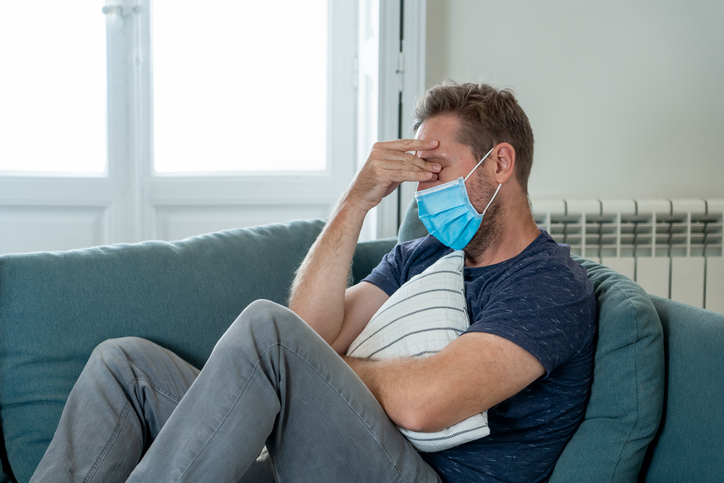
There are many events in life that can cause intense feelings of stress and anxiety. Not only is this true right now due to the effects of the ongoing COVID-19 pandemic, but other situations such as economic turmoil, racial injustice, or war can also trigger these emotions (Caldwell-Harvey & Coelho, 2020). When this happens, it is known as crisis fatigue, and it can lead to various mental health issues like depression, stress, and anxiety (“How to Handle Crisis Fatigue Amid COVID-19”, 2020). Should these feelings go untreated, it can lead not only to harmful physiological effects, but also to poor coping strategies such as drinking excessive amounts of alcohol, overeating, catastrophizing situations, and social isolation (Lefave).
Keep reading to find out why crisis fatigue is a pervasive issue in modern society, and what a life coach can do to help those struggling with it.
What Is Crisis Fatigue? And Which Phases Do People Go Through?
When emotionally trying events happen in the world, it’s difficult for some to not let a response of stress or burnout get the better of them. Though not a formal medical diagnosis, crisis fatigue can lead to a variety of physiological symptoms (Caldwell-Harvey & Coelho, 2020). This is especially true when levels of cortisol and adrenaline, released within the body as a response to stress, remain high after a long time period (“How to Handle Crisis Fatigue Amid COVID-19”, 2020). Normally, these responses to stress are meant to help keep ourselves safe when trying situations happen, known as the “fight-or-flight response” (Schimelpfening & Cassell, 2020). When these feelings continue for longer amounts of time than usual, such as for months or years, crisis fatigue is a potential outcome (Schimelpfening & Cassell, 2020).
Those with a life coach career should also know that there are considered to be four distinct phases whenever a crisis happens. The first is the “heroic” phase, where people work together to take charge and respond accordingly to the situation, followed by the “honeymoon phase” where they feel increased satisfaction about their involvement (Schimelpfening & Cassell, 2020). However, this is typically followed by the root of crisis fatigue, known as the “disillusionment” phase, where people experience negative, stressful emotions for extended time periods (Schimelpfening & Cassell, 2020). The final phase is the “recovery and rebuilding” phase once the crisis is subsiding, which is when those experiencing crisis fatigue learn to restore their sense of calm and happiness (Schimelpfening & Cassell, 2020).

What Are The Symptoms and Triggers of Crisis Fatigue?
Symptoms associated with crisis fatigue can be wide-ranging. They include tense muscles, elevated heart rate, sweating, and fast breathing, each of which are part of the “flight, fight, or freeze” response common with crisis situations (Caldwell-Harvey & Coelho, 2020). Other types of symptoms may include difficulty concentrating, increased self-medication with drugs or alcohol, body aches, anxiety, and feelings of helplessness (Caldwell-Harvey & Coelho, 2020). Although these sensations do not typically last a long time, they can be felt for longer time periods during a situation like a pandemic (Caldwell-Harvey & Coelho, 2020).
Should crisis fatigue happen to someone, they may also experience feelings of numbness, difficulty eating, exhaustion, and changes in their sleep patterns (Caldwell-Harvey & Coelho, 2020). A lack of energy, increased irritability, and making risky decisions are also associated with experiencing crisis fatigue (How to Handle Crisis Fatigue Amid COVID-19”, 2020). Furthermore, these symptoms can happen to different types of people, such as those who work on the frontlines during the COVID-19 pandemic (Caldwell-Harvey & Coelho, 2020).
Another factor that bears repeating with regards to crisis fatigue is that it does not come naturally for humans to be able to withstand long-term feelings of anxiety and stress (Lefave). These symptoms are able to manifest themselves in physical, behavioural, cognitive, and emotional ways. When they don’t subside as the crisis is ongoing, hormone levels will remain high, since the body will still feel under threat in these situations (Lefave).
How Can Those With a Life Coach Career Help Clients With Crisis Fatigue?
Those who have completed their life coach training are likely to have learned about how to teach life skills to clients, as well as how to help them overcome certain obstacles to accomplish their goals. If they are struggling with substance abuse, a life coach can also help them navigate this. With a problem such as crisis fatigue in particular, certain life skills and coping strategies are able to help those experiencing symptoms to be able to more easily manage them. These include maintaining or adopting a routine, focusing their energy on hobbies, and getting exercise (Caldwell-Harvey & Coelho, 2020). Whatever your approach may be as a life coach, it’s become increasingly important for coaches to create an environment that effectively helps clients ease their way out of “survival mode” while under this type of stress (“Burn-out an “occupational phenomenon”: International Classification of Diseases”, 2019).

It is important to emphasize to clients the role self-care can play in helping them overcome feelings of crisis fatigue. When their symptoms are not addressed, it can impede their everyday life, and completing tasks can become more difficult (“How to Handle Crisis Fatigue Amid COVID-19”, 2020). Taking time off work and disconnecting oneself from social media and stress-inducing news coverage are also solutions a life coach can emphasize to clients (Caldwell-Harvey & Coelho, 2020). Additionally, clients should also understand the importance of keeping themselves happy and in good spirits whenever possible. They can accomplish this by engaging in activities that bring them satisfaction and joy, such as talking with friends and family (“How to Handle Crisis Fatigue Amid COVID-19”, 2020).
Furthermore, a life coach can suggest mindfulness meditation as a coping mechanism for stress, as it has been proven by research to be beneficial for one’s health, both physically and mentally (“Mindfulness meditation: A research-proven way to reduce stress”, 2019). Although it is perfectly natural for us to experience feelings of grief, anger, exhaustion, and anxiety, emphasizing to clients the importance of verbalizing their emotions, taking breaks whenever possible, and taking good care of themselves (Kam, 2020).
Want to start taking life coach courses?
Contact Rhodes Wellness College today!
Works cited:
Burn-out an “occupational phenomenon”: International Classification of Diseases. (2019, May 28). Retrieved from https://www.who.int/news/item/28-05-2019-burn-out-an-occupational-phenomenon-international-classification-of-diseases
Caldwell-Harvey, T., & Coelho, S. (2020, November 6). Crisis fatigue: Definition, symptoms, and how to cope. Retrieved from https://www.medicalnewstoday.com/articles/crisis-fatigue
How to Handle Crisis Fatigue Amid COVID-19. (2020, October 15). Retrieved from https://share.upmc.com/2020/10/crisis-fatigue/
Kam, K. (2020, July 21). Crisis Fatigue: Are We Emotionally Overwhelmed? Retrieved from https://www.webmd.com/lung/news/20200721/crisis-fatigue-are-we-emotionally-overwhelmed
Lefave, S. (n.d.). Do You Have Crisis Fatigue? Retrieved March 18, 2021, from https://www.the-well.com/editorial/do-you-have-crisis-fatigue
Mindfulness meditation: A research-proven way to reduce stress. (2019, October 30). Retrieved from https://www.apa.org/topics/mindfulness/meditation
Schimelpfening, N., & Cassell, D. K. (2020, June 22). Overwhelmed and Stressed? Why You May Be Feeling Crisis … Retrieved from https://www.healthline.com/health-news/overwhelmed-and-stressed-why-you-may-be-feeling-crisis-fatigue









